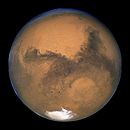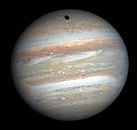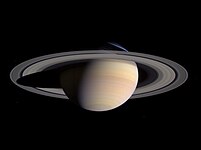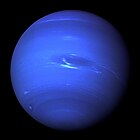| Revision as of 13:56, 24 June 2015 editWavyinfinity (talk | contribs)220 edits →Controversy over IAU definition of "planet" in 2006 and to present day← Previous edit | Revision as of 14:23, 24 June 2015 edit undoWavyinfinity (talk | contribs)220 edits →Controversy over IAU definition of "planet" in 2006 and to present dayNext edit → | ||
| Line 87: | Line 87: | ||
| ::Wow. I never realised I was so strong, able to move my muscles against the gravity of a collapsed dead star. <b>]]<font color="#00b">]</font></b> 08:57, 24 June 2015 (UTC) | ::Wow. I never realised I was so strong, able to move my muscles against the gravity of a collapsed dead star. <b>]]<font color="#00b">]</font></b> 08:57, 24 June 2015 (UTC) | ||
| :::Electrochemical reactions are mediated by the electromotive force, which is 1*10^36, 1*10^39 and 1*10^42 times the strength of gravitation for respective particles proton to proton, electron to proton, electron to electron. So yea, you are that strong, because the force mediating your muscles is beyond gravitation in strength. Fact is, gravity is very, very weak, it can't even hold chemical rockets to the ground. ] (]) 13:56, 24 June 2015 (UTC) | :::Electrochemical reactions are mediated by the electromotive force, which is 1*10^36, 1*10^39 and 1*10^42 times the strength of gravitation for respective particles proton to proton, electron to proton, electron to electron. So yea, you are that strong, because the force mediating your muscles is beyond gravitation in strength. Fact is, gravity is very, very weak, it can't even hold chemical rockets to the ground. ] (]) 13:56, 24 June 2015 (UTC) | ||
| :::Plus I can go ahead and fix the mess so that the controversy can be settled: | |||
| A '''planet''' ({{ety|grc|''] ]'', astēr planētēs, ''or ] ἀστήρ'', plánēs astēr|wandering star}}) is an ancient, evolving ] or stellar remnant. | |||
| It will probably be edited out of existence and my user name banned for fixing the problem though. I already get the Misplaced Pages game, it has to be notable, not be original research, yadda yadda. The fix is so simple though it is shocking. I'm just hoping some other astrophysicists on here see it, so that they can correct themselves.] (]) 14:22, 24 June 2015 (UTC) | |||
| == Sun & Moon == | == Sun & Moon == | ||
Revision as of 14:23, 24 June 2015
 | Planet is a featured article; it (or a previous version of it) has been identified as one of the best articles produced by the Misplaced Pages community. Even so, if you can update or improve it, please do so. | ||||||||||||||||||||||||||||||
| This article appeared on Misplaced Pages's Main Page as Today's featured article on August 24, 2008. | |||||||||||||||||||||||||||||||
| |||||||||||||||||||||||||||||||
| This article has not yet been rated on Misplaced Pages's content assessment scale. It is of interest to the following WikiProjects: | |||||||||||||||||||||||||||
{{WikiProject banner shell}} template instead of this project banner. See WP:PIQA for details.
| |||||||||||||||||||||||||||
|
Archives |
Chiron
2060 Chiron probably should be added to the 'Objects formerly considered planets' table. When it was discovered in 1977, media reports briefly called it the 10th planet. It's now classified as a Centaur asteroid. CFLeon (talk) 04:59, 21 January 2015 (UTC)
- It was just a media speculation. The media doesn't define what's a planet or not. I'm still not quite sure if we should add that Tetra quark 05:44, 21 January 2015 (UTC)
- Agreed. The IAU defines what are planets and what aren't. Perhaps some digging on what they've said on Chiron is in order. RegistryKey 05:45, 21 January 2015 (UTC)
- Numerous people, including astronomers, disagree with the IAU, preferring their own definition of "planet". Their definitions should be in this article, as well, if notable. — Rickyrab. 18:25, 25 January 2015 (UTC)
- I also agree. 'Objects formerly considered planets' should contain objects like Ceres and Pluto, which genuinely were widely called planets, not just a little bit of silly media speculation. Reyk YO! 07:58, 21 January 2015 (UTC)
- Agreed. The IAU defines what are planets and what aren't. Perhaps some digging on what they've said on Chiron is in order. RegistryKey 05:45, 21 January 2015 (UTC)
- People in general define what a planet is. The IAU is one voice, and their grammar is bad (they consider a dwarf planet not to be a planet! Why not call them super-asteroids, if you want to exclude them from planethood? Or, better yet, call them non-orbit-clearing bodies?) — Rickyrab. 18:25, 25 January 2015 (UTC)
- Because those things are horrible to use. Moreover, there is a long tradition in English for parallel things: minor planets are not planets either and sea lions are not lions. --JorisvS (talk) 10:27, 29 January 2015 (UTC)
Lead images
Shouldn't we choose better images to put there? There are dwarf planets, the Moon, and even a white dwarf star there. Perhaps we should choose planet-only images Tetra quark 05:51, 21 January 2015 (UTC)
- Go ahead. The lead images have been the subject of a lot of fire, so I've basically given up taking a position. But if you want to change them, fine. Serendious 11:43, 21 January 2015 (UTC)
- It makes a lot of sense. Plus, the ones originally used were more artistic than realistic. I've gone ahead and replaced it. --JorisvS (talk) 12:43, 21 January 2015 (UTC)
- Still don't love it, but I think a bit smaller would be better. I was playing with the sizes a bit, I think around size=300. Rwessel (talk) 21:18, 21 January 2015 (UTC)
- There is definitely still room for improvement. Maybe 400 is often a bit too filling, with the bottom possibly not shown when the top of the page is displayed, yet 300 may be a bit smallish. What about 350? --JorisvS (talk) 22:38, 21 January 2015 (UTC)
- My main issue with it is that it focuses on the planets of the Solar System, which is a decidedly "20th century" outlook. Planets are no longer only a solar province. Serendious 22:59, 21 January 2015 (UTC)
- I don't think that can be called an issue. Yes, an artist image of an exoplanet would fit well, but the main problem seems to be the size. (edit: set size 300. All planets clearly visible)Tetra quark 23:25, 21 January 2015 (UTC)
- Unfortunately, there are no images of exoplanets. Maybe a graph of the number of known exoplanets? --JorisvS (talk) 09:16, 22 January 2015 (UTC)
- As I said, an artist concept of an exoworld can be good enough. Here is a list of some Earth like planets that possibly have illustrations: List of potentially habitable exoplanets. Again, adding an illustration of an exoplanet isn't urgent or anything Tetra quark 16:05, 22 January 2015 (UTC)
- I'd prefer one with less black in it, if we decide to have one. As for a graph, what about File:KnownExoplanets-Sizes-20140226.png? --JorisvS (talk) 15:44, 23 January 2015 (UTC)
- Well, I personally think it is too detailed for a lead image Tetra quark 15:59, 23 January 2015 (UTC)
- Any image used should be representative of the known population. Do you have good suggestions? --JorisvS (talk) 16:20, 23 January 2015 (UTC)
- Well, I personally think it is too detailed for a lead image Tetra quark 15:59, 23 January 2015 (UTC)
- I'd prefer one with less black in it, if we decide to have one. As for a graph, what about File:KnownExoplanets-Sizes-20140226.png? --JorisvS (talk) 15:44, 23 January 2015 (UTC)
- As I said, an artist concept of an exoworld can be good enough. Here is a list of some Earth like planets that possibly have illustrations: List of potentially habitable exoplanets. Again, adding an illustration of an exoplanet isn't urgent or anything Tetra quark 16:05, 22 January 2015 (UTC)
- Unfortunately, there are no images of exoplanets. Maybe a graph of the number of known exoplanets? --JorisvS (talk) 09:16, 22 January 2015 (UTC)
- I don't think that can be called an issue. Yes, an artist image of an exoplanet would fit well, but the main problem seems to be the size. (edit: set size 300. All planets clearly visible)Tetra quark 23:25, 21 January 2015 (UTC)
- My main issue with it is that it focuses on the planets of the Solar System, which is a decidedly "20th century" outlook. Planets are no longer only a solar province. Serendious 22:59, 21 January 2015 (UTC)
- There is definitely still room for improvement. Maybe 400 is often a bit too filling, with the bottom possibly not shown when the top of the page is displayed, yet 300 may be a bit smallish. What about 350? --JorisvS (talk) 22:38, 21 January 2015 (UTC)
- Still don't love it, but I think a bit smaller would be better. I was playing with the sizes a bit, I think around size=300. Rwessel (talk) 21:18, 21 January 2015 (UTC)
- It makes a lot of sense. Plus, the ones originally used were more artistic than realistic. I've gone ahead and replaced it. --JorisvS (talk) 12:43, 21 January 2015 (UTC)
List of directly imaged exoplanets Marteau (talk) 16:07, 23 January 2015 (UTC)
- Sure, but none of these are usable for the lead here. --JorisvS (talk) 16:20, 23 January 2015 (UTC)
- You said you prefer one with less black in it. I can crop an artistic image and upload it to commons if you wish. Just let me know Tetra quark 16:41, 23 January 2015 (UTC)
- Aside from less black, I'd like a representative image. So, maybe one with a mini-Earth, a super-Earth, and say two types of giant planets (Sudarsky's gas giant classification). --JorisvS (talk) 16:49, 23 January 2015 (UTC)
- @JorisvS: I think what you're trying to say is that you want an image that represents one specific planet that couldn't be any other one. There is a NASA list of artist concepts here and a description for each image, so check it out and see if you like one any of them. Then I will crop the image and upload Tetra quark 17:01, 23 January 2015 (UTC)
- Maybe the first of , the third of , and the class 2 and 5 of Sudarsky's gas giant classification. This gives a hot mini-Earth, a super-Earth, a hot jupiter, and a gas giant in the habitable zone. I think this shows some variety not present with the Solar System eight. --JorisvS (talk) 16:36, 25 January 2015 (UTC)
- @JorisvS: I think what you're trying to say is that you want an image that represents one specific planet that couldn't be any other one. There is a NASA list of artist concepts here and a description for each image, so check it out and see if you like one any of them. Then I will crop the image and upload Tetra quark 17:01, 23 January 2015 (UTC)
- Aside from less black, I'd like a representative image. So, maybe one with a mini-Earth, a super-Earth, and say two types of giant planets (Sudarsky's gas giant classification). --JorisvS (talk) 16:49, 23 January 2015 (UTC)
- You said you prefer one with less black in it. I can crop an artistic image and upload it to commons if you wish. Just let me know Tetra quark 16:41, 23 January 2015 (UTC)
Controversy over IAU definition of "planet" in 2006 and to present day
How come there's no mention of the controversy over the IAU's definition of "planet"? It is misleading to state that "A planet is...", only mentioning the IAU definition of "planet", without pointing out that some astronomers and laypeople disagree with the IAU. At the very least, some mention should be made of alternate definitions of the word. — Rickyrab. 19:25, 25 January 2015 (UTC)
- http://time.com/3429938/pluto-planet-vote/ ...no comment. — Rickyrab. 19:29, 25 January 2015 (UTC)
- That article doesn't give an alternate definition; in fact one of the scientists argues there shouldn't be one, which is not particularly helpful from our point of view. Serendious 21:13, 25 January 2015 (UTC)
- A small audience at a public talk informally decide something and Misplaced Pages is suppose to pay attention? This meaningless 18 Sept 2014 debate has been discussed before. -- Kheider (talk) 22:39, 25 January 2015 (UTC)
- There is controversy of course. The arguments are rooted in their failure to understand basic astrophysics from my point of view. It is claimed in this article, "It is not known with certainty how planets are formed", yet that is the problem. Once they come to the obvious conclusion that stars lose their mass by great amounts and cool/die, they will realize that a "planet" is just an ancient, evolved star which is still cooling and dying. It is actually a double whammy if you think about it. Not only do mainstream astronomers not understand how a planet is formed, but it instantaneously means they never understood star evolution itself. This is not good news for them, it is only good news for people outside of those groups. Earth is not just a bunch of water covered rocks, it is an ancient 3.5+ billion year old star at the very end of its evolution, a black dwarf. Star evolution is planet formation itself, they were never mutually exclusive objects to begin with.Wavyinfinity (talk) 08:52, 24 June 2015 (UTC)
- Wow. I never realised I was so strong, able to move my muscles against the gravity of a collapsed dead star. Serendious 08:57, 24 June 2015 (UTC)
- Electrochemical reactions are mediated by the electromotive force, which is 1*10^36, 1*10^39 and 1*10^42 times the strength of gravitation for respective particles proton to proton, electron to proton, electron to electron. So yea, you are that strong, because the force mediating your muscles is beyond gravitation in strength. Fact is, gravity is very, very weak, it can't even hold chemical rockets to the ground. Wavyinfinity (talk) 13:56, 24 June 2015 (UTC)
- Wow. I never realised I was so strong, able to move my muscles against the gravity of a collapsed dead star. Serendious 08:57, 24 June 2015 (UTC)
- Plus I can go ahead and fix the mess so that the controversy can be settled:
A planet (from Ancient Greek ἀστήρ πλανήτης, astēr planētēs, or πλάνης ἀστήρ, plánēs astēr 'wandering star') is an ancient, evolving star or stellar remnant.
It will probably be edited out of existence and my user name banned for fixing the problem though. I already get the Misplaced Pages game, it has to be notable, not be original research, yadda yadda. The fix is so simple though it is shocking. I'm just hoping some other astrophysicists on here see it, so that they can correct themselves.Wavyinfinity (talk) 14:22, 24 June 2015 (UTC)
Sun & Moon
Could we have a citation for the claim that the Sun and Moon were considered planets in antiquity? That's NOT what is claimed in the linked article, and hasn't been true for the last three thousand years as far as I am aware. Of course, if you define planet as something that appears to revolve around the Earth, then the claim would be true, but who used that definition? Dbfirs 21:08, 3 March 2015 (UTC)
- We can probably grab one from Classical planet. Rwessel (talk) 22:52, 3 March 2015 (UTC)
- Done, from an academic book I have. The ancient Greeks and medieval Europeans defined a planet as a celestial body that moves relative the the fixed stars. A2soup (talk) 00:38, 4 March 2015 (UTC)
- Thanks. The "seven wanderers" does indeed seem to be the origin of our modern word planet, so I withdraw my objection and my claim about not being true for three thousand years. Dbfirs 08:21, 4 March 2015 (UTC)
Moons of Saturn and Jupiter
I'm not an expert on the subject, but I disagree with the classification of the large moons of Saturn and Jupiter as "objects formerly considered planets". It seems that their inclusion in that table is based on the fact that their respective discoverers referred to them as such in the first works that they produced documenting their discovery. There is a big difference between "objects once referred to as planets" and "objects formerly considered planets"-- this was presumably User:JorisvS's rationale for removing Eris as well. Citing Galileo or Cassini or Huygens calling the moons "planets" upon their discovery to justify the claim that they were "considered planets" in a historical sense is a violation of the spirit as well as the letter of WP:NOR. If there are no reasoned objections or reliable secondary-source citations to back up the claim that these moons were "considered planets", I will remove them from the table in a couple days. A2soup (talk) 01:20, 4 March 2015 (UTC)
- The problem is that the major moons where considered secondary planets in many sources. -- Kheider (talk) 06:35, 4 March 2015 (UTC)
- I believe it, but I'd like to see some secondary sources covering their historical classification so we can make an informed decision about whether they were really ever considered to be true planets. My view is that if the moons were considered "secondary planets" from the start, then they were never considered to be in the same class as the true planets-- the word "planet" was used simply because no other term for a celestial body existed at that time, not because they were seen as planets like all the others. So it is wrong to say that they were ever "considered planets" in the same way the Sun, Moon, the early asteroids, and Pluto were. Unlike the Jovian/Saturnian moons, these "real" former planets occupied the same place in the cosmos as the true planets, orbiting the Sun (or Earth, depending on the prevailing conception of the cosmos). What it boils down to is that I don't see any secondary sources clarifying the matter. In the absence of such sources, we should not assume that they were considered planets. A2soup (talk) 07:18, 4 March 2015 (UTC)
- Even in 1782 moons were known as secondary planets. But does that mean a secondary planet was not a planet that moved against the background stars? Looking at Google Books Ngram Viewer, It looks like the terms "primary planet" and "secondary planet" both feel out of favor as the term asteroid became common in the 1860s. I am not sure blanking the term "secondary planet" from this article is in the best interest of the readers. -- Kheider (talk) 22:38, 4 March 2015 (UTC)
- Interesting-- it's clearly more complicated than I thought at first. I still think they perhaps should go, but I'll look into it myself before I take anything out. Perhaps we can just add a clarification in the table that they were always accorded secondary status and never seen as in the same class as the primary planets? I worry that the way it is now, people will take away the impression that the moons were initially mistaken for planets, like the asteroids or Pluto were, which is very far from the truth. A2soup (talk) 00:19, 5 March 2015 (UTC)
- I agree the term "secondary planet" needed (still needs?) some kind of disclaimer/explanation. I have added the comment, "They were known as secondary planets". -- Kheider (talk) 16:17, 5 March 2015 (UTC)
- Thanks for that!
Now if we could find a time around when the "secondary planet" terminology became deprecated in favor of "satellite" and "moon", we could make it downright informative. I don't think Google Ngrams is a good enough source, though, and it isn't very clear on the question anyways. I'll poke around and try to find something, but it will probably be quite difficult.Ah, I just followed your secondary planet link, and the linked section seems to provide all the clarification needed. Thanks again for the thoughtful clarification! A2soup (talk) 16:33, 5 March 2015 (UTC)
- Thanks for that!
- I agree the term "secondary planet" needed (still needs?) some kind of disclaimer/explanation. I have added the comment, "They were known as secondary planets". -- Kheider (talk) 16:17, 5 March 2015 (UTC)
- Interesting-- it's clearly more complicated than I thought at first. I still think they perhaps should go, but I'll look into it myself before I take anything out. Perhaps we can just add a clarification in the table that they were always accorded secondary status and never seen as in the same class as the primary planets? I worry that the way it is now, people will take away the impression that the moons were initially mistaken for planets, like the asteroids or Pluto were, which is very far from the truth. A2soup (talk) 00:19, 5 March 2015 (UTC)
- Even in 1782 moons were known as secondary planets. But does that mean a secondary planet was not a planet that moved against the background stars? Looking at Google Books Ngram Viewer, It looks like the terms "primary planet" and "secondary planet" both feel out of favor as the term asteroid became common in the 1860s. I am not sure blanking the term "secondary planet" from this article is in the best interest of the readers. -- Kheider (talk) 22:38, 4 March 2015 (UTC)
- I believe it, but I'd like to see some secondary sources covering their historical classification so we can make an informed decision about whether they were really ever considered to be true planets. My view is that if the moons were considered "secondary planets" from the start, then they were never considered to be in the same class as the true planets-- the word "planet" was used simply because no other term for a celestial body existed at that time, not because they were seen as planets like all the others. So it is wrong to say that they were ever "considered planets" in the same way the Sun, Moon, the early asteroids, and Pluto were. Unlike the Jovian/Saturnian moons, these "real" former planets occupied the same place in the cosmos as the true planets, orbiting the Sun (or Earth, depending on the prevailing conception of the cosmos). What it boils down to is that I don't see any secondary sources clarifying the matter. In the absence of such sources, we should not assume that they were considered planets. A2soup (talk) 07:18, 4 March 2015 (UTC)
Greek word for planet
I have noticed the revert of a change of the Greek expression for "planet". However, Wictionary also does not say πλάνητες. It says πλάνης, πλανήτης or πλανάτας. Besides this, I am not sure if Wiktionary is acceptable as a source of information for Misplaced Pages. --Jan Kameníček (talk) 18:51, 10 March 2015 (UTC)
The correct term is πλανήτες you can in the Greek wiki the term is el:Πλανήτης Aurilios (talk) 19:04, 10 March 2015 (UTC)
- πλάνης gives πλάνητες as its plural. There is also πλανήτης, and that has πλανῆται as its plural. This is for Ancient Greek, where the actual origin of term lies. Modern Greek πλανήτης, though, has πλανήτες as its plural. --JorisvS (talk) 19:21, 10 March 2015 (UTC)
- Thanks for explanation. Meanwhile i found it also at A Greek-English Lexicon]. --Jan Kameníček (talk) 19:34, 10 March 2015 (UTC)
The moon as a classical planet
The IP editor is basically correct, the moon (along with the Sun, Mercury, Venus, Mars, Jupiter and Saturn) was considered one of the seven planets in ancient/medieval times. I would guess that reference #59, the one for the Sun, mentions that, but it's offline and I don't have a copy. We could probably just use reference #1 from Classical planet. In any event, the text should be formatted to match the other entries in that column of the table. Rwessel (talk) 21:24, 7 June 2015 (UTC)
Alternative lead image
Here's an alternative infobox (right side), which I consider an improvement over the existing version (left side). As it is a question of taste, I just post it here on the talk page. What do you think, anyone? -- Cheers, Rfassbind -talk 08:02, 22 June 2015 (UTC)

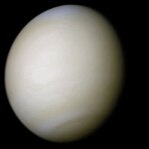
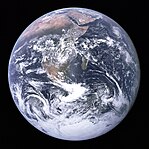
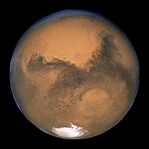


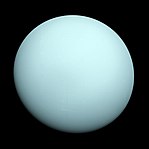
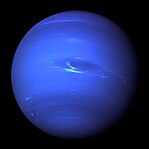 The eight planets of the Solar System in order from the Sun: Mercury, Venus, Earth, Mars, Jupiter, Saturn, Uranus, and Neptune. The planets are shown in true color but not to the same scale.
The eight planets of the Solar System in order from the Sun: Mercury, Venus, Earth, Mars, Jupiter, Saturn, Uranus, and Neptune. The planets are shown in true color but not to the same scale.
| ||||||||
The eight planets of the Solar System (in order from the Sun)
The planets are shown in true color but not to the same scale. |
- It has the benefit of showing Saturn a bit larger, but it has more black in it. I like the new caption, which I've put directly into the article, because it is not dependent on this choice. --JorisvS (talk) 10:00, 22 June 2015 (UTC)
- Thx, the adopted caption is very much appreciated. I've also created a framed version without resizing the images. Maybe that's some kind of compromise. -- Cheers, Rfassbind -talk
- I prefer a framed version to what we have now, but don't mind either way between the original sizing and resized version. Both are great. A2soup (talk) 12:16, 22 June 2015 (UTC)
- Thx, the adopted caption is very much appreciated. I've also created a framed version without resizing the images. Maybe that's some kind of compromise. -- Cheers, Rfassbind -talk
- Misplaced Pages featured articles
- Featured articles that have appeared on the main page
- Featured articles that have appeared on the main page once
- Old requests for peer review
- All unassessed articles
- Pages using WikiProject banner shell with duplicate banner templates
- Unassessed Astronomy articles
- Unknown-importance Astronomy articles
- Unassessed Astronomy articles of Unknown-importance
- Unassessed Solar System articles
- Unknown-importance Solar System articles
- Solar System task force
- FA-Class Astronomy articles
- Top-importance Astronomy articles
- FA-Class Astronomy articles of Top-importance
- FA-Class Astronomical objects articles
- Pages within the scope of WikiProject Astronomical objects (WP Astronomy Banner)






